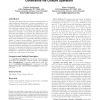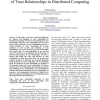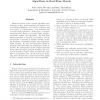1438 search results - page 2 / 288 » A general formalism for the analysis of distributed algorith... |
SAC
2010
ACM
14 years 5 days ago
2010
ACM
The aim of this short paper is to present a general method of using background knowledge to impose constraints in conceptual clustering of object-attribute relational data. The pr...
KBSE
2005
IEEE
13 years 11 months ago
2005
IEEE
Traits are basically mixins or interfaces but with method bodies. In languages that support traits, classes are composed out of traits. There are two main advantages with traits. ...
EUROCRYPT
1999
Springer
13 years 9 months ago
1999
Springer
A recoding rule for exponentiation is a method for reducing the cost of the exponentiation ae by reducing the number of required multiplications. If w(e) is the (hamming) weight of...
JCP
2006
13 years 5 months ago
2006
In this paper, we discuss a general methodology for analysis and modeling of trust relationships in distributed computing. We discuss the classification of trust relationships, cat...
IPPS
2006
IEEE
13 years 11 months ago
2006
IEEE
Advanced wireless sensor network algorithms pose challenges to their formal modeling and analysis, such as modeling probabilistic and real-time behaviors and novel forms of commun...




